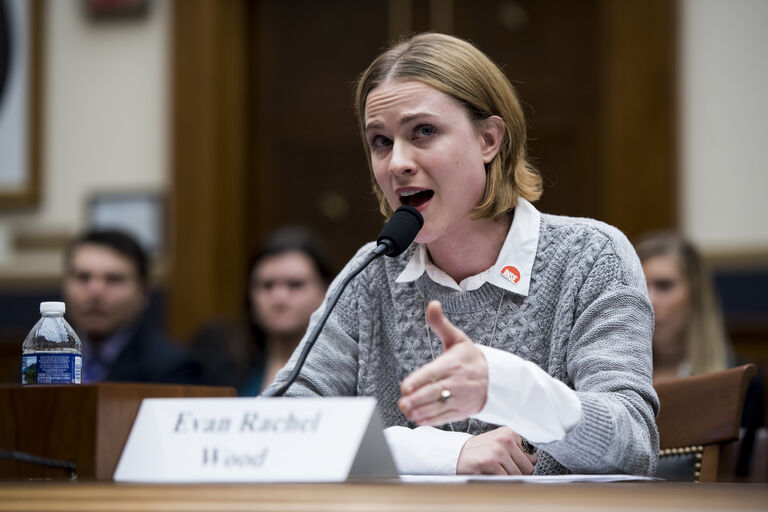On Tuesday, actress and activist Evan Rachel Wood testified in front of Congress as a push to get more states to adopt the federal Sexual Assault Survivors’ Bill of Rights Act. She shared her story, detailing harrowing experiences of sexual assault and abuse in hopes of helping other abuse survivors.
The Sexual Assault Survivors’ Bill of Rights Act provides survivors with basic rights in federal assault cases, but currently has only been adopted by nine states.
“I’m here today to use my position as an artist, survivor, mother and advocate to bring a human voice to the population of 25 million survivors in the U.S. who are currently experiencing inequality under the law and who desperately need basic civil rights,” Wood told the congressional committee.
Wood was joined by Amanda Nguyen, the CEO and founder of RISE, an organization that aids in protecting rape survivors, as well as RISE’s chief of staff Lauren Libby, and Rebecca O’Connor, the vice president of the Rape Abuse Incest National Network (RAINN).
The Westworld star’s testimony included heartbreaking accounts of sexual assault as well as verbal and physical abuse from a former partner. Wood recounted that her former partner raped her while he believed her to be unconscious. She also outlined being raped by another man in a storage closet at a bar. She called for “recognition of basic civil rights for sexual-assault survivors,” naming the act as a “safety net that may help save someone’s life one day.”
Committee chairman Bob Goodlatte (R-Va.) pointed out that the rights delineated in the Sexual Assault Survivors’ Bill of Rights Act are not recognized by most states, but the same rights are afforded to survivors of federal crimes.
“And of course, it is in the states where most sexual assault cases are prosecuted,” Goodlatte said.
According to the Congressman, the Bill “assured that in federal cases, a victim would have the right to have their rape kit preserved for the duration of the statute of limitations or up to 20 years; a victim would not have to pay for their own forensic examination; a victim would be informed of any results of their forensic examination; would be provided with written policies on forensic testing kits; and finally, would be informed before their sexual assault examination kit was destroyed and be permitted to request further preservation.”
Wood’s testimony was necessary and important, especially as an out bisexual woman. According to the CDC, bisexual women areat a higher riskof intimate partner violence, showing higher rates of rape, physical violence, and/or stalking by an intimate partner, as compared to lesbian and heterosexual women. Seventy-five percent of bisexual women in the U.S. reported experiencing sexual violence compared to 46 percent of lesbian women and 43 percent of heterosexual women.
The Emmy-nominated actress said that the #MeToo movement was simultaneously “empowering and validating for survivors” like herself, but also extremely triggering.
“While no one had to tell me that rape was such a worldwide epidemic, to see the flood of stories so similar to my own was both freeing and soul-crushing,” she said. “Waves of memories and details came flooding into my brain every time I read the words. I froze. I thought I was the only human who’d experienced this and I carried so much guilt and confusion about my response to the abuse.”
Wood also explained the long-term effects of abuse, noting, “So often we speak of these assaults as no more than a few minutes of awfulness, but the scars last a lifetime. Even though these experiences happened a decade ago, I still struggle with the aftermath.”
“My relationships suffer, my partner suffers, my mental and physical health suffers,” she continued. “Rape is often more than a few minutes of trauma, but a slow death.”
The actress and mother documented her trip to D.C. onsocial media, posting emotional videos of her first time standing in front of Congress. She concluded her testimony by speaking on motherhood and her responsibility to protect her son.
“This makes me think of my son and the world that he will be raised in and the day I will have to explain to him what rape means and why it happened to his mother. When I knew I was to become a mother I prayed for a boy for this reason,”she said.“However, I realized it could be just as easy for my son to fall prey to the lies society tells us about men. … So I’m also here to advocate for men and for my son, who I hope grows up knowing he’s much more valuable than that and who I can only hope I will set an example for by continuing to fight for him and myself and for all the people affected by abuse, because that is our job as parents and as leaders.”
Photo By Bill Clark/CQ Roll Call
Don't forget to share:
Help make sure LGBTQ+ stories are being told...
We can't rely on mainstream media to tell our stories. That's why we don't lock our articles behind a paywall. Will you support our mission with a contribution today?
Cancel anytime · Proudly LGBTQ+ owned and operated
Read More in Culture
The Latest on INTO
Subscribe to get a twice-weekly dose of queer news, updates, and insights from the INTO team.
in Your Inbox













